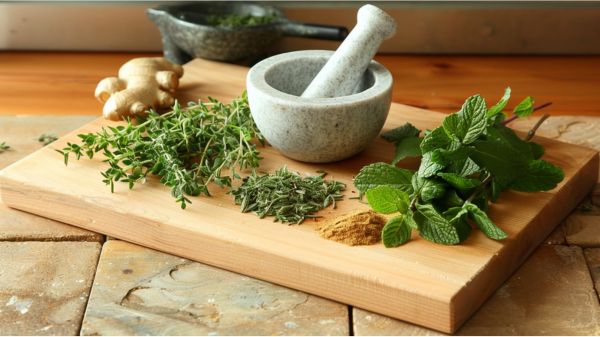7 Herbal Remedies from Natural Herbs for Digestive Health Relief
Did you know that digestive issues affect approximately 60 to 70 million people in the United States each year? When it comes to finding natural relief, exploring herbal remedies can be a beneficial path to consider. These 7 natural herbs offer a gentle and holistic approach for your digestive health relief.
By incorporating these herbs into your daily routine, you may discover a newfound sense of comfort and well-being. Ready to explore the power of nature in promoting digestive health?
Key Takeaways
- Herbal remedies like ginger, chamomile, and turmeric aid digestion and reduce digestive discomfort.
- Marshmallow root soothes and protects the digestive tract, aiding in inflammation and ulcer healing.
- Combining herbs optimizes digestive benefits for natural relief.
- Maintaining hydration, diet balance, exercise, and stress management are vital for digestive wellness.
Gentiana Lutea
Gentiana lutea, commonly known as yellow gentian, stimulates digestion by triggering the release of digestive enzymes and bile. This bitter herb, revered in herbal medicine, supports your digestive system naturally.
By enhancing the production of digestive enzymes and bile, gentian aids in breaking down food effectively, reducing issues like indigestion and bloating. The bitter constituents in gentian activate taste receptors, which in turn promote the secretion of saliva and gastric juices, priming your gut for optimal nutrient absorption.
Embracing the power of gentian can help you liberate your digestive health, allowing you to savor meals without the discomfort of bloating and supporting your body in absorbing essential nutrients for overall well-being.
Zingiber Officinalis
Zingiber Officinalis, also known as ginger, offers a centuries-old remedy rooted in Chinese medicine, providing effective relief for various digestive ailments. Incorporating ginger into your routine can help soothe your stomach and alleviate digestive discomfort naturally.
Here are some ways ginger can benefit your digestive health:
- Relieves Nausea: Ginger is known for its anti-nausea properties, making it a natural remedy for queasiness.
- Improves Digestion: Consuming ginger helps normalize the digestive process, aiding in better nutrient absorption.
- Settles Upset Stomach: Ginger can calm an upset stomach and reduce bloating and gas.
- Anti-Inflammatory Effects: It contains compounds that reduce inflammation in the gastrointestinal tract.
- Fresh Ginger Tea: Enjoy a cup of fresh ginger root tea to reap the digestive benefits of this natural herb.
Matricia Chamomilla
German chamomile, also known as Matricia Chamomilla, is a medicinal herb renowned for its anti-inflammatory properties and calming effects on the digestive system. This herb is a natural remedy traditionally used to alleviate various digestive issues, including bloating, gas, and indigestion.
Matricia Chamomilla contains chamazulene, a compound that contributes to its anti-inflammatory effects, making it beneficial for gastrointestinal discomfort. Consuming German chamomile as a tea can help soothe the digestive tract and promote overall digestive health.
Research suggests that this herb may also reduce spasms in the digestive system, offering valuable relief for those seeking natural solutions for digestive discomfort.
| German Chamomile | Benefits |
|---|---|
| Anti-inflammatory | Calms digestive system |
| Chamazulene compound | Soothes gastrointestinal issues |
| Digestive relief | Reduces spasms in the digestive tract |
| Natural remedy | Promotes digestive health |
| Holistic approach | Alleviates bloating and gas |
Curcuma Longa
Explore the holistic benefits of Curcuma Longa, also known as turmeric, renowned for its anti-inflammatory properties that nurture your digestive system.
Discover how incorporating this golden spice into your daily routine may assist in easing digestive discomfort and promoting overall gut health.
Let nature’s remedy, Curcuma Longa, guide you towards a path of digestive relief and well-being.
Turmeric Benefits
Unlock the digestive benefits of turmeric, a potent herb renowned for its anti-inflammatory properties and therapeutic potential in managing gastrointestinal ailments. Turmeric, scientifically known as Curcuma longa, can aid digestion and support gastrointestinal health.
The active compound, curcumin, is particularly beneficial in addressing conditions like dyspepsia and ulcerative colitis. While incorporating turmeric into your diet or using supplements can promote digestive wellness naturally, individuals with gallbladder issues should exercise caution due to the potential exacerbation of their condition.
Remember that WHO Monographs recognize turmeric for its medicinal properties in treating various gastrointestinal disorders, making it a valuable addition to your holistic approach to digestive relief.
- Turmeric, a potent herb with anti-inflammatory properties
- Curcumin, the active compound, beneficial for dyspepsia and ulcerative colitis
- Caution advised for individuals with gallbladder issues
- Recognized in WHO Monographs for treating gastrointestinal disorders
- Promotes digestive wellness naturally
Usage Tips
To maximize the benefits of Curcuma Longa for digestive health, consider incorporating it into your daily routine in various forms such as teas, smoothies, or as a seasoning in your cooking. Turmeric, also known as Curcuma longa, is a powerful herb that can aid in alleviating digestive disorders.
For a healthy digestive system, try adding turmeric along with ginger for nausea relief, or brew a soothing peppermint tea infused with turmeric. These herbal remedies can be particularly beneficial for conditions like irritable bowel syndrome.
Embrace the natural healing properties of turmeric and explore different ways to include it in your diet to support your digestive well-being.
Foeniculum Vulgare
Nurture your digestive well-being naturally with the herb Foeniculum vulgare, commonly known as fennel, celebrated for its digestive benefits.
Fennel aids in preventing gassiness, bloating, heartburn, and constipation by promoting the secretion of digestive enzymes. Traditionally used for infants with colic, fennel’s pleasant anise-like flavor can be consumed as seeds, tea, or added to dishes.
The aromatic properties of fennel help soothe the digestive tract, alleviating discomfort and promoting overall digestive health. Embrace the power of fennel to support your body’s natural rhythms and find relief from digestive issues.
Trust in the wisdom of this herbal remedy to bring balance and liberation to your digestive system.
Cynara Scolymus
Embrace the digestive benefits of Cynara Scolymus, commonly known as artichoke, a herb celebrated since the Roman Empire for its ability to support overall gastrointestinal health. This herb stimulates bile flow, aiding in digestion and enhancing liver and kidney function.
With its richness in cynarin, artichoke can help alleviate symptoms of irritable bowel syndrome and maintain cholesterol levels. For those experiencing acid dyspepsia, artichoke’s soothing properties offer relief from digestive discomfort.
Studies support the effectiveness of artichoke in normalizing the digestive process and promoting gastrointestinal health. Incorporating artichoke into your routine can assist in improving your digestive well-being naturally, providing a holistic approach to digestive relief.
Althaea Officinalis
With its mucilage-rich root, Althaea Officinalis, commonly known as marshmallow, provides a gentle and soothing remedy for various digestive issues. This herb, with its demulcent properties, can be a natural solution for your digestive tract problems. Here are some key benefits of Althaea Officinalis:
- Althaea officinalis is known for its mucilage content that coats and calms the digestive tract.
- Marshmallow root’s demulcent properties help reduce inflammation in the gastrointestinal system.
- It forms a protective barrier in the stomach, aiding in conditions like gastritis and ulcers.
- Althaea officinalis can alleviate digestive discomfort, including acid reflux, by soothing the digestive mucosa.
- Consider incorporating marshmallow root into your herbal remedies for digestive liberation.
Frequently Asked Questions
What Natural Herb Helps With Digestion?
For better digestion, consider herbal remedies like ginger tea or chamomile tea. Turmeric powder and slippery elm can also aid in digestive relief. Remember to include probiotic foods and apple cider vinegar in your diet for gut health.
How Can I Fix My Digestive System Naturally?
To fix your digestive system naturally, prioritize gut health with probiotics and digestive enzymes. Embrace fiber-rich foods and stay hydrated. Manage stress through mindful eating. Sip herbal teas for soothing relief. Practice yoga poses to aid digestion. Opt for prebiotic foods in a balanced diet.
What Is a Natural Cure for Gastrointestinal Disease?
For a natural cure for gastrointestinal disease, incorporate probiotic foods, herbal teas, gut healing, anti-inflammatory herbs, digestive enzymes, fermented foods, and aloe vera. These remedies can aid in balancing your system and promoting digestive wellness.
What Is the Best Natural Supplement for Digestion?
For optimal gut health and relief from bloating and stomach discomfort, consider incorporating herbal remedies like ginger for its digestive benefits. Its probiotic and enzyme support can aid in easing food intolerances naturally.
Conclusion
Incorporating these powerful natural herbs into your daily routine is like giving your digestive system relief a soothing hug from Mother Nature herself. Say goodbye to tummy troubles and hello to a harmonious gut that will leave you feeling light, balanced, and at peace.
Embrace the healing power of these natural wonders and let your body thank you with every comfortable, happy sigh. Your digestive health deserves nothing less than the best nature has to offer.









One Comment
Comments are closed.